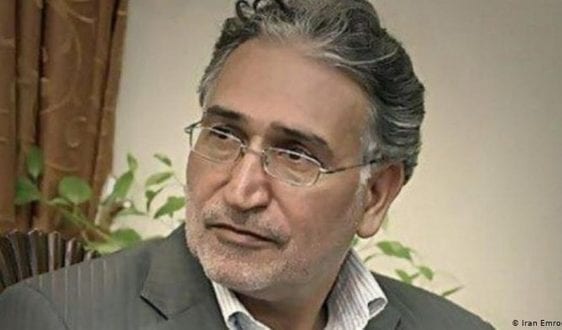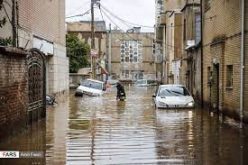Iranwire – United Nations human rights experts have called for the immediate release of documentary filmmaker and political activist Mohammad Nourizad, who is currently being held in Evin Prison.

Stating that they feared for his life, the six special rapporteurs said in a statement published on May 4: “We strongly condemn the ill treatment of Mohammad Nourizad and the continuation of his imprisonment for expressing his views.”
They said the failure to provide the activist with adequate medical treatment amounted to torture, and highlighted other inhumane treatment. They urged officials to take action, and said that Nourizad would likely die if they did not.
IranWire talked to Fatemeh Maleki, the wife of Mohammad Nouri, about her husband’s condition in prison and about the harassment her family has faced.
***
Fatemeh Maleki says her husband’s health is deteriorating and judicial officials have failed to take any steps to treat him or secure his release.
Mohammad Nourizad started a hunger strike 50 days ago, and has only had water to drink during that time. He contracted coronavirus, and, in addition to this, he has refused to take his heart medication and has repeatedly threatened suicide in protest against authorities’ continued negligence of his medical needs and refusal to release political prisoners.
“I went to see him yesterday after three weeks,” Fatemeh Maleki told IranWire. “He told me he had lost his hearing in his left ear and his eyesight was affected. Unfortunately, under the influence of the hunger strike, he is slowly losing consciousness. And, since March, he has been constantly injuring himself in protest against the negligence. He came to the meeting hall yesterday with a bloody face. His face and forehead were bloody. It was a very sad scene that I witnessed.”
Nourizad, who is being kept on Ward 6 at the prison, had previously harmed himself on March 2 after months of being deprived of seeing or contacting his family. A few days later he was allowed to see his wife, but prior to this, he self-harmed again, cutting a vein in his neck and arm.
“I do not know how long he will last, and I do not know how long the authorities will be able to watch these scenes and do nothing,” Fatemeh Maleki said.
According to her, doctors at Taleghani and Atieh hospitals, where Nourizad has been transferred from prison several times over the past year, have made it clear that his physical state is extremely fragile.
Mohammad Nourizad suffers from heart disease and diabetes and must take daily medication. But his wife says he has not had any medication for 50 days now. He often loses consciousness because of the toll the hunger strike and lack of medication has taken on him.
And yet no action has been taken, and Ministry of Intelligence agents are thought to have played a direct role in keeping him in jail.
“A few months ago, the intelligence agents who saw him in prison said that he should stay there at least until the presidential election,” said Maleki. “That is, it does not matter if something bad happens to him; he will not be released until after the election.”
Iran’s presidential election is due to be held on June 18, 2021.
Harassment of the Entire Family
“Mohammad’s demand is the unconditional release of political prisoners, his son and himself,” Maleki said. “At the moment, no attention has been paid to him.”
IranWire also asked Fatemeh Maleki about her husband receiving injections of an unknown substance, which apparently took place earlier on in his time in prison. “No answer has been given to him or us about this heinous act yet. We still do not know what this was and why it was injected into him. Someone heavy sat on his chest and forcibly injected it into him. He was not even cared for; no nurse was sent to look after him in the room at the time, and then he was sent back to prison. Unfortunately, he has been transferred from prison to the hospital several times over the past year, but has been returned to prison without full treatment.”
Zeinab Nourizad, Mohammad Nourizad’s daughter, released an audio file on social media on April 22. In the recording, she announced that her father had been transferred to Loghman Hospital after falling unconscious in prison, where he had been given eight unspecified injections. Zeinab Nourizad urged human rights activists to do something for her father.
Prior to this, Mohammad Nourizad had described the harassment he and his family had endured. “My daughter and I had Covid for three weeks, but during this time they did not allow us to call so that we could at least ask each other how we were in this bitter situation,” he said.
His son Ali has also been targeted, and was sentenced by a revolutionary court to three years and six months in prison and taken to Greater Tehran Prison, also known as Fashafuyeh, on October 3, 2020, to serve his sentence. Maleki believes that her son was arrested purely as a way to further harass Mohammad Nourizad.
Ali Nourizad, 35, is a business management graduate and worked for a computer company before his arrest. He was charged with “conspiracy against national security” for participating in a protest rally protesting against the downing of an Ukrainian passenger plane by Revolutionary Guards-fired missiles. At the time of Ali’s arrest and transfer to prison, his father was in Mashhad prison.
Mohammad Nourizad, a former journalist for Kayhan newspaper and a documentary filmmaker, has been detained several times in the last 12 years. He wrote publicly to Supreme Leader Ali Khamenei during the 2009 protests that followed the disputed presidential election results, calling for a change in the country and for the human rights of Iranian citizens to be upheld.
His letters and appeals went unanswered, but he received a response: he was arrested on December 20, 2009 and sentenced to prison and flogging at Branch 26 of the Revolutionary Court, charged with national security crimes.
After his release, Nourizad continued his appeals and letter-writing to Khamenei; in addition, he became a regular protester, joining most big civil and political protests.
In spring 2019, Mohammad Nourizad joined 13 civil society activists in issuing a statement calling for Ali Khamenei to resign as Leader. The letter became known as the “14 Signatures” or “Group 14”.
Following the letter going public, he was arrested in August 2019 and sentenced to 15 years in prison, two years in exile in Izeh, and a two-year ban from leaving the country. In August 2020, his lawyer announced that he had been further sentenced to eight months in prison, 74 lashes, and one year in exile in Tabas.
“My demand is for the unconditional release of political prisoners,” said Fatemeh Maleki, joining her husband’s call for justice. “Most of them are innocent. An example of this is an oppressed young man who was hospitalized for a year in Aminabad and then in Roozbeh Psychiatric Hospital for a year. His mother’s hand was badly injured by a machine press where she worked. The young man was sentenced to three to four years in prison for participating in the protests of November 2019. He has served a third of his sentence, but despite the fact that he should be released under the law, this has not yet been approved. I urge the freedom of all these people, together with the freedom of my husband and son.”
 Shabtabnews In this dark night, I have lost my way – Arise from a corner, oh you the star of guidance.
Shabtabnews In this dark night, I have lost my way – Arise from a corner, oh you the star of guidance.



